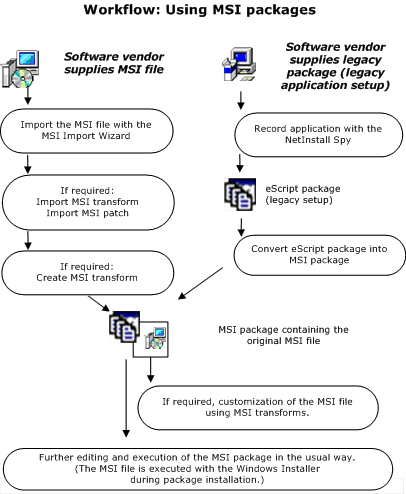DSM Support for MSI packages
Ivanti DSM supports the creation, modification and execution of MSI-based software. MSI-based software is always managed inside a (DSM) MSI Package, and the MSI Package itself goes through the "usual" steps.
For better differentiation,
the original MSI Package (MSI file) is named MSI-based
software in the following, an original MSI-based software package
that has been included in the DSMC’s software library is named MSI
package.
Since both packages have the same contents, only the term MSI Package
is used in the DSMC.
Incorporating an MSI-based Software into a DSM MSI Package
In order to be distributed, MSI-based software is added to MSI Packages. These packages are used in the same way as "normal" packages.
MSI Packages which have been created with the MSI import
wizard generally contain only one MSI-based software.
MSI Packages allow transforms and patches to be added with the wizard (via
a context menu).
All packages which have
more than one MSI-based software, or which are not explicitly marked MSI
packages, are counted as "normal" eScript Packages. Take note
that such packages do not allow transforms or patches to be integrated
with the wizard.
These packages can only be changed by modifying the eScript directly.
The MSI commands MSIInstallProduct, MSIConfigureFeature, MSIApplyPatch
and MSIUninstallProduct are available for
this.
MSI Transform Editor
In the DSMC, you can add transforms to an MSI Package or create new transforms.
MSI Patches
Ivanti DSM supports the patching of MSI Packages.
Converting an eScript Package into an MSI Package (Repackaging)
If the software vendor does not ship his application as an MSI-based software, you can generate an MSI-based software yourself from the legacy setup procedure (a process known as repackaging). This package will then also be managed as part of a DSM MSI Package. With the MSI Repackager, you can create MSI-based software from eScript Packages for legacy applications (non-MSI applications).
Executing MSI Packages
To install a DSM MSI Package, you proceed as you would for executing other packages - you use the Installer or AutoInstaller. The MSI Package itself is then executed automatically using the WindowsInstaller. If the Windows Installer is not yet installed on the client, the Installer installs it automatically.
Ivanti DSM
supports advertising for MSI-based software.
You can change
the installation status of features
in an already-installed MSI-based software.
Resolving Path Specifications and Variables during Initial and Re-Installation
When executing a DSM MSI Package you can pass on the values of properties as parameter to the Windows Installer. This allows you to control the execution of the MSI-based software independently of the parameter values. In turn, you can specify the values of the parameters with variables.
Please consider the following:
Path Variables
When initially executing an MSI Package, values of path variables are written to the local copy of the MSI database. When re-executing the package , e. g. if a repair is required, the Installer uses the cached information.
Other Variables
Values of variables not used for paths are not cached locally. When re-executingthe package, the default value specified in the MSI property table is used to resolve the variable. Please note that the default value may differ from the value you specified as a parameter for the MSIInstallProduct command.
Disable Windows Installer Messages
If required, use this configuration table setting
to disable all Windows Installer messages:
MSI
Settings > Disable Windows Installer User Interface
The following graphic provides an overview of the relevant steps.
